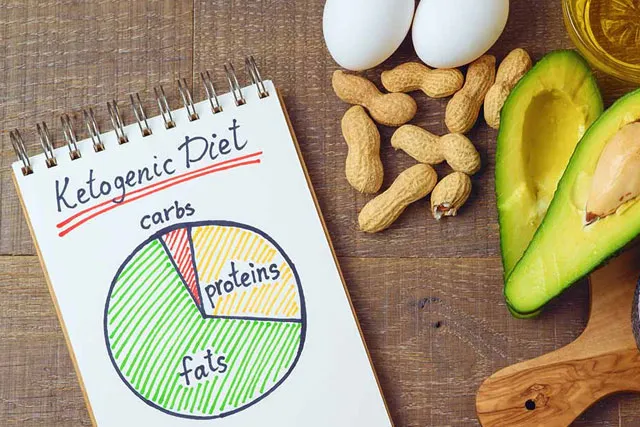

Finding the right dietitian for Ketogenic Diet near you in Delhi has never been easier! Certified best nutritionist for Ketogenic in Delhi for your Lifestyle Wellness, Nt. Divya Gandhi provides you Best Diet Plan.
Specialized dietitian in Delhi offering expert guidance on the ketogenic diet for improved health and weight management.
The ketogenic diet is a high-fat, low-carbohydrate, and adequate-protein diet that has been specifically designed for managing various diseases such as Obesity, Type 2 diabetes, and Intractable Epilepsy. Our extensive research on the Ketogenic Diet has positioned us as one of the leading experts in designing personalized Ketogenic diet plans for weight loss, diabetes, and intractable epilepsy.
It has a long history of being used to treat medical conditions like diabetes and intractable epilepsy, particularly in children for whom traditional medications have proven ineffective. Additionally, it has shown promising results in the treatment of cancer, polycystic ovary syndrome, and Alzheimer's disease. Let's delve deeper into the intricacies of the Ketogenic diet to provide you with a comprehensive understanding.
The Ketogenic diet can aid in weight loss in Delhi by reducing carb intake and increasing fat consumption, leading the body into a state of ketosis. During ketosis, fats are converted into ketones, which serve as an energy source for the brain. Over time, the body becomes adept at utilizing fat and ketones for fuel instead of carbohydrates.
This diet may assist in fat loss and muscle preservation due to the higher calorie requirement for converting fat into energy compared to carbs. Additionally, a high-fat, high-protein diet might increase satiety, potentially resulting in reduced calorie intake, although this claim lacks definitive evidence.
Studies have shown that individuals on a ketogenic diet lost significantly more weight than those on a low-calorie, low-fat diet. Furthermore, maintaining a well-balanced high-fat ketogenic diet can lead to improvements in triglyceride and HDL cholesterol levels.
Nonetheless, it is crucial to ensure that one meets their calorie requirements while following a ketogenic diet. Drastically cutting calories can slow down metabolism, making long-term weight loss more challenging.
The Ketogenic Diet and Its Benefits for Type 2 Diabetes
The Ketogenic Diet is based on the concept of ketosis, which is achieved by consuming a diet that is extremely low in carbohydrates. The specific amount of carbohydrates may vary depending on the plan being followed and the stage of the plan.
This diet has been proven to offer numerous health benefits, particularly in terms of controlling blood sugar levels and minimizing insulin spikes. When we consume carbohydrates, our blood glucose levels rise rapidly, leading to a quick insulin response from the pancreas. The excess blood glucose is then dispersed by insulin, causing us to feel hungry again. By following a low-carbohydrate diet, we can maintain steady and low blood sugar levels, effectively avoiding spikes in hunger caused by carbs. Lowering insulin levels is crucial for the success of any diet, as insulin is the hormone responsible for fat storage. By keeping insulin levels low, we create an environment in our bodies that limits fat storage and promotes the breakdown of fat.
The Ketogenic Diet for Intractable Epilepsy
Epilepsy is a common neurological disorder that affects individuals of all ages. It is characterized by unpredictable seizures and can lead to various health issues. While most people with epilepsy can effectively manage their seizures with medication, around 20-30% of individuals experience difficulty in achieving seizure control despite trying different drugs. This condition is known as intractable or refractory epilepsy (IE). In such cases, the Ketogenic Diet has been found to be the most suitable option. Developed in the 1920s for the treatment of pediatric epilepsy, the Ketogenic Diet is a high-fat, low-carbohydrate, and adequate-protein diet that has shown promising results in managing IE.
The ketogenic diet has proven to be effective in approximately 50% of patients who try it, and even more effective in about one-third of patients. In fact, the efficacy of this diet surpasses that of most new antiepileptic drugs. Ms. Divya Gandhi, a skilled Dietician & Nutritionist, has introduced an Indian version of the ketogenic diet that is not only more palatable but also easier to follow. The Nt. Divya Gandhi team is dedicated to helping intractable epileptic patients in their journey towards treating their condition with the ketogenic diet. Our team provides regular follow-ups for these patients and educates their family members on ketogenic diet recipes, as well as the measurement of ketones using keto diastix, and other related aspects. Additionally, we offer a modified Atkins diet and a low glycemic index diet as alternative treatment options for intractable epilepsy.
It is worth noting that approximately 20% of children who follow the ketogenic diet achieve freedom from seizures, and many are able to reduce or completely eliminate the use of anticonvulsant drugs. Typically, after around two years on the diet or after six months of being seizure-free, the diet may be gradually discontinued over a period of two to three months. This discontinuation process involves gradually lowering the ketogenic ratio until urinary ketosis is no longer detected, and then removing all calorie restrictions.
This approach to discontinuation is similar to the method used when children become seizure-free through anticonvulsant drug therapy. However, when the diet is used to treat specific metabolic diseases, the duration of the diet may be longer. The overall duration of the diet is determined by the treating ketogenic diet team and the parents, with durations of up to 12 years being possible.
It is important to note that children who discontinue the diet after achieving seizure freedom have a 20% risk of seizures returning. The length of time until recurrence can vary greatly but typically averages around two years. This risk of recurrence is comparable to a 10% risk for surgical intervention (where part of the brain is removed) and a 30-50% risk for anticonvulsant therapy.
Benefits:
• The ketogenic diet is a medical nutrition therapy that involves participants from various fields.
• Ketogenic diets may also provide advantages in managing diabetes, cancer, epilepsy, and Alzheimer's disease.
• One of the benefits of restricting carbohydrates is that it helps maintain stable blood sugar levels after a meal, resulting in lower insulin levels, a hormone associated with weight gain.
• A low-carb diet can help reduce appetite, aiding in weight loss.
• It is beneficial for lowering LDL (bad) cholesterol levels and increasing HDL (good) cholesterol levels.
• It is particularly helpful for individuals with diabetes and insulin resistance.
• Low-carb diets are an effective approach to lowering blood pressure.
• It has therapeutic effects on several brain disorders. Glucose is essential for the brain, and in the absence of carbohydrates, the liver produces glucose from protein.
• It has the potential to reduce seizures in individuals with intractable epilepsy.
Engaging in the battle against various illnesses can potentially lower the chances of developing specific types of cancer, diabetes, cognitive disorders, and more.
Insulin is a hormone that enables the utilization or storage of sugar as energy in the body. By following ketogenic diets, the body rapidly consumes this energy source, reducing the need for storage. Consequently, the body requires and produces less insulin. These decreased insulin levels could offer protection against certain cancer types and potentially impede the progression of cancer cells. This diet, characterized by low carbohydrates and high fats, may also have therapeutic benefits for specific cancers, Alzheimer's disease, and various other health issues.
The keto diet presents additional restrictions that individuals should take into account before attempting it, including:
1. Individual outcomes: The effectiveness of the keto diet in terms of weight loss can vary from person to person. Consequently, the diet will have different effects on individuals.
2. Challenging adherence: The keto diet imposes strict limitations on food choices, making it difficult to sustain over a prolonged period. If someone discontinues carbohydrate restriction, they may regain any lost weight. It is advisable to follow a maintenance diet with the guidance of a registered dietitian.
3. Saturated fat concerns: Since ketosis can be maintained regardless of the type of fat consumed, there is a potential reliance on animal fats or saturated fats, which are associated with long-term health risks.
It is important for individuals to consult with a medical professional or a registered dietitian before making any significant changes to their diet.
Adverse Reactions
The keto diet can be a significant adjustment for numerous individuals. Consequently, transitioning into ketosis with a sudden shift to a low-carb diet could lead to adverse reactions in certain individuals.
1. Individuals may encounter several problems such as:
- sleeplessness
- tiredness
- queasiness and throwing up
- migraines
- bowel issues
- lightheadedness
- reduced blood glucose levels.
Some additional dangers of a diet high in fat and protein are:
- Formation of kidney stones
- Development of hepatic steatosis (fatty liver)
- Hypoproteinaemia, characterized by low protein levels in the blood
- Deficiency in essential vitamins and minerals
Moreover, potential adverse effects may manifest as the "keto flu," which could present as headache, weakness, irritability, bad breath, and fatigue.
Ketoacidosis
Elevated levels of ketones in urine and high blood sugar levels are indicators of ketoacidosis. An individual can conduct a ketoacidosis test at home using a kit.
Less common triggers of ketoacidosis can include drug misuse, emotional trauma, physical trauma, stress, and surgery. These factors can contribute to the development of ketoacidosis in individuals with diabetes.
Early symptoms of ketoacidosis may include abdominal pain, difficulty concentrating, dry skin, excessive thirst and a dry mouth, acetone-like breath through the mouth, frequent urination, nausea and vomiting, and shortness of breath or rapid breathing.
Individuals with diabetes who follow a keto diet must carefully monitor their ketone levels. If these levels become too high, it can lead to the occurrence of ketoacidosis, which is a life-threatening complication of diabetes. Ketoacidosis happens when the body breaks down fats too quickly, resulting in extremely high levels of ketones that can poison the body.
Additionally, problems with insulin therapy can also contribute to the development of ketoacidosis. This can occur when scheduled treatments are missed or when an individual does not receive enough insulin. It is crucial for individuals with diabetes to properly manage their insulin therapy to prevent the onset of ketoacidosis.
Prevention
The ketogenic diet has been associated with various health risks such as low blood pressure, kidney stones, constipation, nutrient deficiencies, and an increased risk of heart disease. Additionally, strict diets like the keto diet may lead to social isolation or disordered eating. It is important to note that individuals with conditions involving their pancreas, liver, thyroid, or gallbladder should avoid the keto diet as it is not safe for them.
For individuals with diabetes, there are several preventive measures to avoid ketoacidosis. These include carefully monitoring blood sugar levels at least three to four times per day, consulting with a specialist to determine the appropriate insulin dosage, following a diabetes treatment plan, and regularly checking urinary ketones with a test kit, especially during times of illness or stress.
To make the transition to a ketogenic diet smoother and reduce symptoms of keto-flu, it is recommended to gradually reduce carbohydrate intake while increasing fat and protein in the diet.
















20 Mar 2024
Mrs. Divya Gandhi is the best dietition at the moment. I had followed many dietition in the last 2 years and now I am completely settled with Divya... Read Full Testimonial
3 Mar 2024
It was really good. She is very supportive and gives the right diet to treat the issue. She is always available at the time of need. The diets given to... Read Full Testimonial
18 Feb 2024
The experience was very good...easy diet plans that could be followed at home comfortably.. The best part that d dietian understands that u might need... Read Full Testimonial
10 Feb 2024
I have been to many dietition and I have always felt a lot of pressure of following rigorous diet and with Divya its not about pressure at... Read Full Testimonial
31 Jan 2024
Divya Gandhi is exceptionally well nutritionist, initially I was bit sceptical about going to a dietician thinking it will not help since I was not able to loose... Read Full Testimonial
29 Jan 2024
It's been 1 and a half month since I have started following her diet plans and I have lost 7kgs and I am very happy and impressed I would love to... Read Full Testimonial
6 Jan 2024
Divya is a nice doctor. She understands your health condition, then prescribes a diet which is not very tough to follow. Lot of patience is required to... Read Full Testimonial
18 Oct 2023
Divya is very friendly and warm person.I like her flexible meal plans and her diets are easy to follow.She listens you patiently and gives diet according to... Read Full Testimonial
9 July 2023
I never thought dieting would be such fun. It was a wonderful experience consulting Divya. Weight loss was so easy. She always understands what... Read Full Testimonial
28 June 2023
Till now my experience with Divya is very good.she gives all kind of food items that can very well keep all your taste buds active and relishing. I started... Read Full Testimonial
22 Mar 2023
Experience was amazing with Dr. Divya the way she talk and understands the issue and basis on which she guides. Whenever I had any issue or concern... Read Full Testimonial

Dietitian Divya Gandhi in Delhi has built a lot of Credibility in many years. Dietician Divya Gandhi in Delhi has become the Top Most verified Nutritionist in Delhi.
Read about us on Google by just writing Divya Gandhi. See yourself our testimonials and reviews.
See yourself our testimonials and reviews by clicking the below icons.
Top Most Verified Dietitian on Practo & Apollo


Our Clients
Happy Clients
Kgs Weight Loss
1. Book your consultation
Choose online or offline and share your basic details.
2. Complete your health assessment
We analyze medical history, lifestyle, eating habits, and goals.
3. Receive your customized diet plan
A weekly Indian meal plan tailored to your body and routine.
4. Start your program
Follow easy meals with flexible food options and substitutes.
5. Weekly follow-ups
Track progress, adjust calories, and modify meal plans as required.
6. See visible results
Sustainable weight loss, improved energy, and better health.
It doesn't matter at all where you stay. My programs are available across the globe. I manage my online clients very methodically.
We have built a lot of credibility in the last 10 to 12 years. We are the top most dietitians in North Delhi.
Dt. Divya Gandhi is rated the top most dietitian in Delhi on Practo. She has held this number 1 spot from the last 8 years.
We got the highest number of reviews and testimonials on Practo and Google which proves that we have the ability to take care of our clients
We have so far catered to 15000 plus clients in the last 8 to 10 years and has delivered a weight loss of 70000 kgs among 15000 plus clients
To validate us to what I have told you right now, while reading this, please write dietitian in North Delhi on Google. You will yourself see that we are the top rated dietition.
She is panellist on many news channel like CNBC, Zee News, India Today.
We have 20 plus celebrities on board Like Rashmi Desai, Tina dutta etc. Will share the list of celebrities.
Our Focus is just not on weight loss, our focus is also what will happen once your weight loss target is met. We will educate you how to maintain the weight you have lost. As this is more important to sustain the amount of weight you have lost. Our association will not end once you have met your desired weight loss objective. We will keep working with you and make you understand how to go back to your lifestyle without gaining weight.
If you give me a guarantee that that you will follow like a good student, I will also give you a guarantee that you will lose unless you have an underlying medical history you are not aware of.
And also I can't give you 100% guarantee that you will lose but I give you a guarantee that we will work very closely with you and will find out why the desired weight loss is not coming and will work it out accordingly.
If you are living in a hostel and you get a weekly Menu time-table from the hostel then I will draft a meal based on that time-table and will certainly guide you to pick the best possible healthy options. However, if there is no time-table which is being given to you by the hostel then it becomes very tough to follow a regular diet plan. In that case only one time consultation is enough. Or we might ask you to buy some groceries that don't need any cooking, like milk, curd, cucumber, fruits, etc.
Absolutely not required to go to gym, what's important to get yourself involved in any sort of physical activity like Walking, yoga meditation etc. Losing weight has no connection whether you are going to gym or not. In fact if you are over 100 kgs then it's not recommended to join gym at all. First lose around 15 to 20 kgs and then go ahead and start with your gym training.